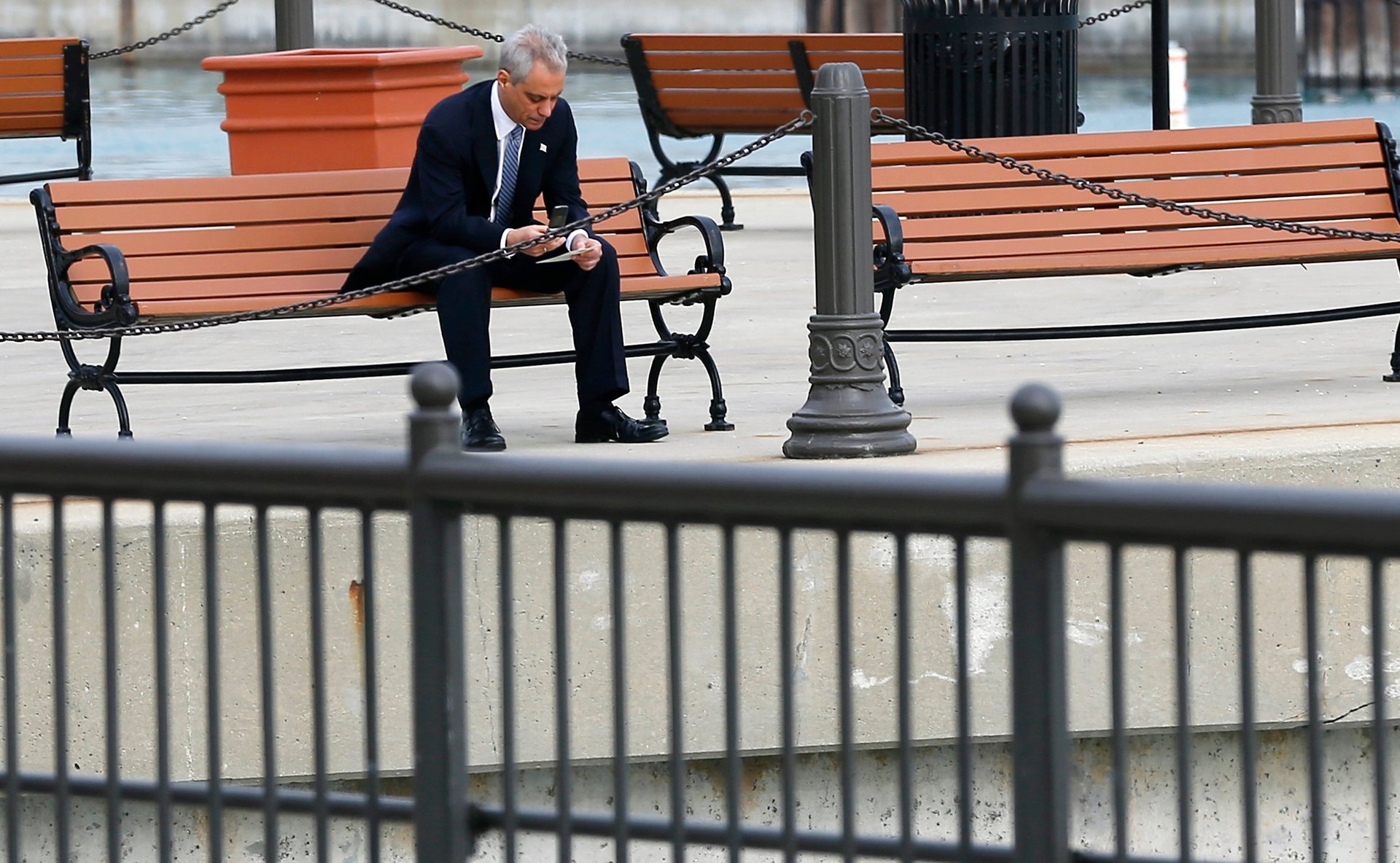In Chicago, Rahm Emanuel takes cues from a president: Frank Underwood
Chicago Mayor Rahm Emanuel’s bid for re-election in an April run-off just got tougher.


Chicago Mayor Rahm Emanuel’s bid for re-election in an April run-off just got tougher.
On Thursday, the third place finisher in the February election, Willie Wilson, endorsed Emanuel rival, Jesus “Chuy” Garcia. Wilson, a businessman who won slightly over 10% of the vote, is black and hopes to convert his supporters to Garcia’s cause.
Wilson joins other prominent African American Chicagoans, including Rev. Jesse Jackson and Congressman Danny Davis, in supporting Garcia, a Hispanic politician who was little known until his second place finish in the February election. Garcia, so unprepared to be a mayoral candidate that he says he is still waiting for advisors to present him with a plan to tackle the city’s finances, is now a real threat.
As the race tightens in Chicago, it is almost as though Emanuel and his spin doctors are channeling the ruthless and little loved President Frank Underwood on Netflix’s just released Season 3 of the House of Cards.
Consider this:
Like Underwood, Emanuel is facing a tough economic situation and unhappy citizens. Embarrassingly, Chicago’s debt rating is just two steps above junk status because of looming pension liabilities. Meanwhile city residents are furious about closed schools, a rash of red light and speed cameras with steep fines, an increase in homicides and police shortcomings.
Like Underwood, Emanuel is facing an opponent whose platform is fighting for ordinary citizens. Garcia, who is backed by the Chicago Teachers’ Union, is promising to pull out red light cameras and hire more cops.
Most crippling of all, like Underwood, Emanuel is characterized as ruthless and a bully. In Chicago, the mayor’s brusque style and temper is much discussed. “Emanuel lacks time to become likable, will have to go negative,” was the headline of Chicago Tribune column by John Kass, pointing out the mayor’s huge likability deficit. In a new campaign ad, Emanuel himself acknowledged that he isn’t really liked. “I can rub people the wrong way. Or talk when I should listen,” he says facing the camera squarely. “I own that.”
A dose of truth telling Frank Underwood style? “Tonight, I give you the truth,” Underwood says in a televised address, carefully calculated to win voter support and undercut Congress. “The truth is this: The American dream has failed you.”
It’s exactly there though that the similarity ends. The difference is that while Underwood is much worse than his public persona, Emanuel’s public persona places a harsh spotlight on his worst traits. Underwood tries to publicly project an image of a man of the people. Emanuel seems to relish his image as tough as nails guy. It’s an image that worked in his favor in the post-Daley era when Chicago needed someone to make tough choices. As the incumbent though, Emanuel’s spin doctors might have failed him.
Yes, he is brusque, demanding, rude and impatient. There are well documented incidents of skirmishes with the media (example: Emanuel abruptly walking out of a press conference when asked whether his children would go to public or private school). There’s the notorious story of Emanuel sending a Mafioso style gift of a dead fish to a pollster who got the results wrong. There’s President Barack Obama’s famous quip describing Emanuel as being rendered practically mute when he lost part of his middle finger.
What doesn’t get much attention, however, is the softer side of Emanuel.
I read his brother Ezekiel’s memoir, “Brothers Emanuel: A Memoir of an American Family,” when it first came out. What lingers in my mind is the image of the three young Emanuel boys going with their activist mother Marsha to rallies and civil rights marches, including one led by Rev. Martin Luther King Jr. I remember a story in the book of a deeply tanned Rahm and his younger brother Ari being sometimes mistaken for African Americans and fighting back when ordered off a beach in Chicago. The Emanuel brothers come across as combative and belligerent but also deeply loyal and yes, empathetic.
And then there is the view from David Axelrod, President Obama’s political strategist and a close Emanuel friend. In his new book, “Believer,” Axelrod writes of Emanuel’s reluctance to join the Obama White House. Emanuel was a Congressman in 2008, part of the House leadership and had a good shot at being the first Jewish Speaker. “To a guy comfortable with his life and allergic to failure, Obama’s offer was perilous proposition,” writes Axelrod. And yet, “For all Rahm’s take-no-prisoners approach to politics, he also takes public service seriously. He was the son of an immigrant and believed that when the president of the United States asks you to serve, you just didn’t say no. Whatever his misgivings, he knew that, if asked, then he couldn’t refuse.”
Emanuel’s public image has none of the humanity and sense of social purpose that these admittedly affectionate glimpses provide. The truth though is that while Chicago’s precarious finances may well be as fragile as a house of cards, Emanuel is certainly no Francis Underwood. In the rush to position himself as an efficient manager and hard knuckled fighter, the Chicago mayor is only succeeding in presenting himself as an Underwood-like caricature. Yet, as the incumbent, this is still his election to lose. We’ll have to wait for the next episode–of the race in Chicago–to see what happens.